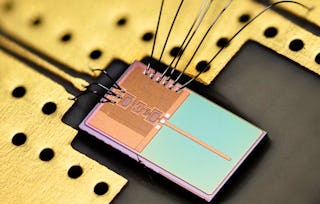This unique Master-level course offered by the Center for Wireless Technology Eindhoven (CWT/e) of the Eindhoven University of Technology, The Netherlands, provides students with in-depth knowledge and hands-on experience on RF and mmWave circuit design.

RF and millimeter-Wave Circuit Design
Seize the savings! Get 40% off 3 months of Coursera Plus and full access to thousands of courses.

RF and millimeter-Wave Circuit Design


Instructors: Carlos Mendes, Jr.
25,672 already enrolled
Included with
246 reviews
Details to know

Add to your LinkedIn profile
19 assignments
See how employees at top companies are mastering in-demand skills

There are 6 modules in this course
Instructors


Offered by
Explore more from Electrical Engineering
 Status: Preview
Status: Preview Status: Preview
Status: PreviewEindhoven University of Technology
 Status: Preview
Status: Preview Status: Preview
Status: Preview
Why people choose Coursera for their career

Felipe M.

Jennifer J.

Larry W.

Chaitanya A.
Learner reviews
- 5 stars
76.42%
- 4 stars
20.73%
- 3 stars
1.62%
- 2 stars
0.40%
- 1 star
0.81%
Showing 3 of 246
Reviewed on Sep 1, 2022
an excellent course on RF circuit component designing with a profound backgroud theory and literature.
Reviewed on Jul 15, 2021
Wish that there are more the Quizes tp answer and more details presentation slides
Reviewed on Oct 31, 2023
This is a very interesting course, I've enjoyed pretty much. I think, It's a course not for beginners, you must have very strong foundations.

Open new doors with Coursera Plus
Unlimited access to 10,000+ world-class courses, hands-on projects, and job-ready certificate programs - all included in your subscription
Advance your career with an online degree
Earn a degree from world-class universities - 100% online
Join over 3,400 global companies that choose Coursera for Business
Upskill your employees to excel in the digital economy

